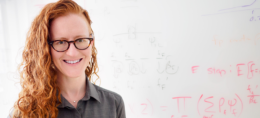Posts Tagged ‘faculty’
The Science of Antiaging
UC Berkeley’s Irina Conboy, Ph.D., is unlocking the keys to healthy longevity
Diablo Magazine features the Conboy Lab’s research on the aging process, and ways to reverse it.
Jay Keasling Receives Distinguished Scientist Fellow Award
Professor of Bioengineering and Chemical & Biomolecular Engineering Jay Keasling has been named a Distinguished Scientist Fellow by the U.S. Department of Energy’s Office of Science. Keasling was recognized for his “national scientific leadership in synthetic biology that has advanced DOE’s strategy in renewable energy, especially the realization of biofuels and bioproducts that enable biomanufacturing at scale and inspire and grow the U.S. bioeconomy,” according to the Office of Science award citation.
Read MoreHerr named to NASEM standing committee
Professor Amy Herr has been named to the National Academies of Sciences, Engineering, and Medicine “Standing Committee on Biotechnology Capabilities and National Security Needs. The standing committee will work to identify advanced biotechnologies that have promising capabilities to meet national security needs, and to identify early-stage research that may lead to new or enhanced biotechnologies. BioE PhD alumni Professor Amina Qutub of the University of Texas, San Antonio, has also been appointed.
Read MoreFive-year NIH grant supports collaborative research into rejuvenating the aging brain
Irina Conboy is one of the principal partners of a new joint study on the aging brain. Conboy, an expert in aging and blood-based rejuvenation, will partner with Yi Zuo, a professor of molecular, cell and developmental biology at UC Santa Cruz, and Philippe Mourrain, a professor of psychiatry and behavioral sciences at Stanford University. The group are looking specifically at changes to blood composition and how immune cells in the brain and central nervous system called microglia alter cognition with age, hoping to identify therapeutic interventions.
Read MoreUsing two CRISPR enzymes, a COVID diagnostic in only 20 minutes
Patrick Hsu, Liana Lareau and Daniel Fletcher have collaborated on a new rapid COVID test that rivals the sensitivity of the gold-standard qRT-PCR testing, with results in less than an hour.
Read MoreLareau named Rose Hills Innovator
The Rose Hills Innovator Program supports distinguished early-career faculty at UC Berkeley interested in developing highly innovative research programs in the fields of science, technology, engineering, and math. The program provides seed support for projects with an exceptionally high scientific promise that may generate significant follow-on funding. Congratulations to Professor Liana Lareau, named a 2021 Rose Hills Innovator.
Read MoreStreets wins 2021 Shu Chien Early Career Award
Congratulations to Prof Aaron Streets, winner of the second annual Shu Chien Early Career lecturer competition at the UC Systemwide Bioengineering symposium.
Read MoreWhat We Learned Doing Fast Grants
Professor Patrick Hsu and collaborators have published a 1 year retrospective describing what they learned from starting a Fast Grants process for rapid COVID research funding, and the need for more models and experimentation in science funding. The article was published in Future.
Read MoreBakar BioEnginuity Hub: Berkeley’s bold new home for innovation, entrepreneurship
Professor Amy Herr is the Executive Director of the Bakar BioEnginuity Hub (BBH), a new campus initiative that aims to launch world-changing startups to solve pressing technical problems. BBH and it’s associated Bakar Labs incubator will open this fall in a renovated Woo Hon Fai Hall, a space where campus scholars and startup founders will work at the convergence of life and physical sciences — including engineering and data sciences — to transform academic research into viable companies that improve the world.
Read More







